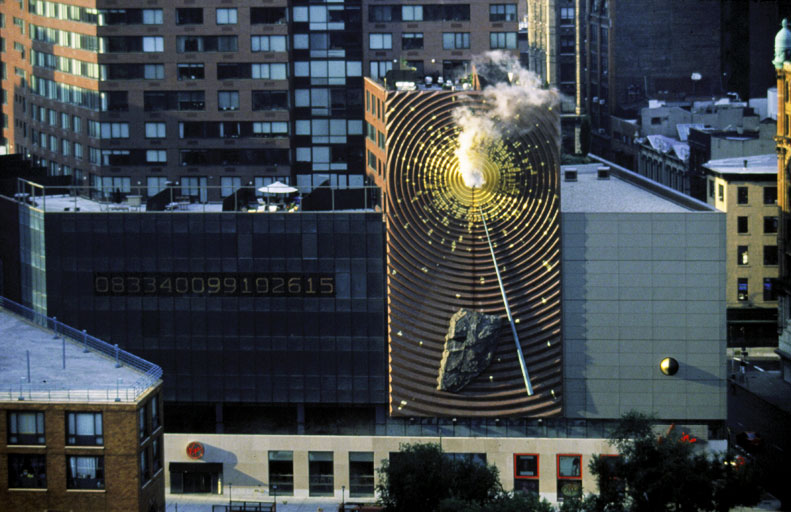|
The Countdown
I was waiting for a bus at Union Square East. It was cold and it was winter and it was night. I stood on the sidewalk by a black fire hydrant that was stuck in cement, cement that was engraved with dozens of names. The bus stop where I was waiting was in front of a building with four tall fake-looking Greek columns, right next door to a Babies ‘R Us. From where I was standing I could see only the last four numbers of the countdown clock. I didn’t know it was a clock until last summer when I was walking with Avery across Union Square and a guy stopped us and told us the whole history. He explained that the orange LED numbers that were constantly changing showed the time. If you read the clock from left to middle, it shows the time in military time: two digits for the hour, two digits for the minutes, and two digits for the seconds. If you read the clock backwards from right to middle, it counts down the time left until midnight. So, the two digits on the far right show the hours left until midnight, the two digits to the right of them show the minutes left, then the two digits to the right of the minutes show the seconds. The guy also explained those giant rings with the hole in the centre to the right of the clock, and pointed out an orb on the far right side of the wall that apparently rotates to show the current phase of the moon. I had never noticed that part, and the numbers on the clock part had just been mysterious to me. I had assumed that it was counting something, that it was representing something, like maybe the national debt. And I guess I was right. It was counting something. Time. After the guy explained the whole thing to us like a docent in a museum, he said that giving that speech about the art was part of how he earned his living, and that he appreciated donations. So we gave him money and went on our way. I think about all he said sometimes when I walk across Union Square. I wonder how many of the people around me know about the clock, and how many don’t. From the bus stop, I could only see the last four numbers of the clock, the countdown to midnight. I looked at the four orange numbers. 1602. That means there are 2 hours and 16 minutes left in the day. But the four numbers together look like they could stand for a year. 1602. I wondered what was going on that year, 1602. Plymouth Rock? Then I realized I had never been in Union Square when the clock got to midnight and reset. A fleet of yellow taxis was waiting at the red light. It was cold and I wondered when the bus would get there. MTA has a website called MTA Bus Time. I looked at it on my phone. There’s a list of bus stops named for their location and there’s a little icon of the bus next to the stop it’s stopping at or approaching. The little bus icon was getting closer to my stop. It was making its progress, climbing down its ladder, down the list of stops. It was another kind of countdown, this one in stops, this one in distance. What if I decided not to get on the bus when it arrived? What if I decided to wait and watch the clock count down to midnight? The clock is like an hourglass, the sum of time on one side and the balance of time on the other. I imagined the clock getting to perfect equilibrium, all zeros, at midnight, and rainbow waves of light like an aurora borealis beaming and radiating above the Burlington Coat Factory. Could I miss such a gorgeous phenomenon? Avery doesn’t believe in countdowns. Because in a countdown, you’re focusing on the numbers, on counting, and not on being in the moment. But looking at the countdown clock that night with the bus getting closer to me, stop by stop, I somehow felt consciously where I was at that moment in space and time. I was waiting for a bus in Union Square, and there were two hours and sixteen minutes left until midnight. Jamie Christensen Jamie Christensen graduated with a B.A. in comparative literature from Brigham Young University. She currently lives, works, and writes in New York City. Website: https://jcbookreviews.wordpress.com/ Twitter: @jamieannindigo
0 Comments
Your comment will be posted after it is approved.
Leave a Reply. |
The Ekphrastic Review
COOKIES/PRIVACY
This site uses cookies to deliver your best navigation experience this time and next. Continuing here means you consent to cookies. Thank you. Join us on Facebook:
July 2024
|




